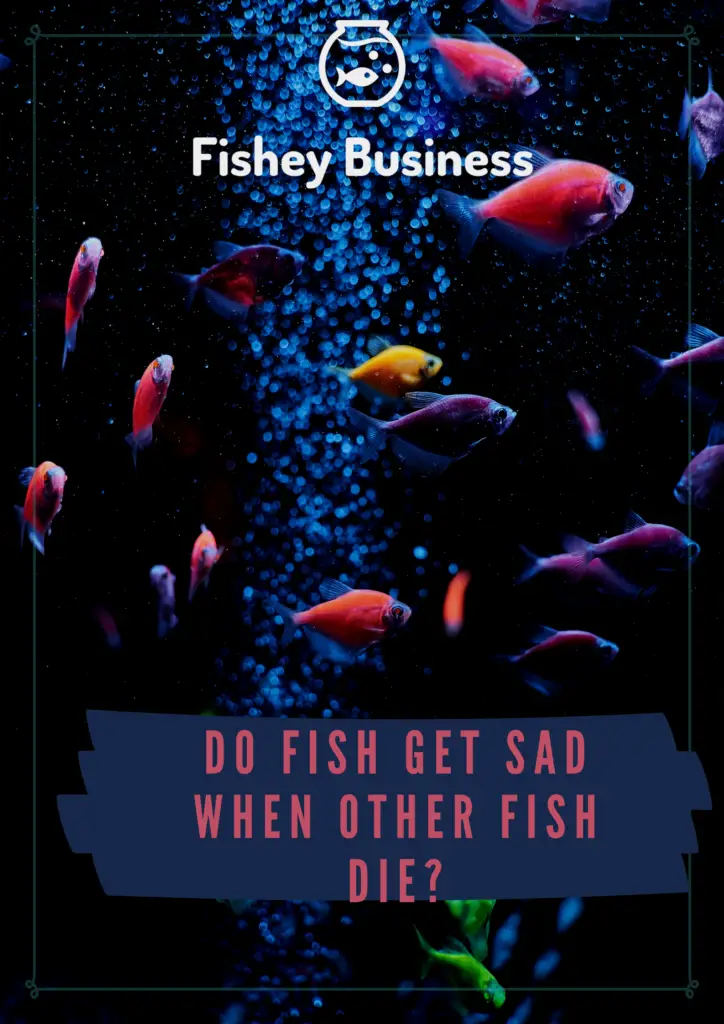It is a genuine concern among fish owners who often ask, do fish mourn the death of other fish?
Well, there isn’t much evidence that links a fish’s depression with the death of its fellow mate. However, you may be surprised to learn that fish can get stressed and depressed for various reasons.
They are intelligent in the way that they can feel emotional stress and pain to a limited degree. And as opposed to popular beliefs, fish have social and emotional needs just like cats and dogs!
In a study done by the University of Burgundy in France, it was found that fish can have pessimistic emotions when their chosen mates are taken away from them.
Similarly, they have other responses to different stimuli.
Can Fish Get Depressed?
This is a question that I often come across in fish health forums. And to answer that, according to the article published by New York Times, I would say, yes, fish can definitely get depressed.
Julian Pittman states in this NYT article that fish depression cannot just be observed; it can be diagnosed too. They tend to lose interest in exploring or eating and start moping around the floor until they’re given an antidepressant.
I am not sure if one should absolutely go by this research before there are other studies to measure its accuracy. However, being around your fish can tell you a lot about how it is feeling and what emotions it is trying to project.
Do Fish Get Lonely?
In general, fish do not get sad about being lonely. But sometimes, certain species like discus, platies, guppy and shoaling fish may need to be around the company of other fish to stay active.
They can get stressed if there is no socializing with other fish for a long time. This sometimes also leads to the death of the fish.
However, that is not to say that fish can get lonely in general. Scientists are still researching to find out what emotions can drive a fish during the absence of its mates.

Do Fish Show Emotions?
This is again a debatable topic that we cannot be sure of. Since fish do not have a face or cry and laugh as humans do, it is difficult to tell what emotions it is trying to show physically.
We often perceive them as emotionless creatures because they’re silent. But a lot of their actions speak about what the little swimming guy must be going through.
So, does that mean fish have feelings? Various fish have shown that signs of pain and fear are some of their basic and primitive emotions. They have skilled these feelings over the thousand years of their existence. So yes, they are very much capable of communicating feelings through their fins and tails.
Can Fish Be Suicidal?
Yes, there have been videos and experiences shared by fish owners who mention fish committing suicide. In no way would this mean the fish was upset emotionally and decided to end its life as humans do.
Of course, they can be stressed or scared because of another fish’s death in the tank. But it’s probably one of the rarest occasions when fish commit suicide in such circumstances.
Besides, another important reason for fish suicide has to be a bad tank system. You cannot make the water temperature too hot or too cold that the fish freezes there.
Believe it or not, a poor living condition often leads to fish jumping out of the tank. Sickness can also be one of the reasons for committing suicide of a fish.
Do Fish Grieve?
Grieving isn’t a practical concept in fish books. Unless the fish is individually bonded, there are very few chances of them grieving for their dead.
They may react to some extent but in a more physiological way than an emotional way. Also, pairs may look lost for a while when one of them dies, but because fish have short-lived memory, they can get over the death in no time.
Sometimes fish release a substance called Schreckstoff when they’re stressed. It is likely that the other fish in the tank may release this substance when a fellow fish dies in the tank.
When this substance gets released, the fish may seem unusual for some time. They feel warned and sense danger resulting in the release of this chemical.
Signs That a Fish is Depressed
There are several ways to tell whether your little fellow is happy or depressed. One of the first things is physical health. If you notice that your fish is getting slimmer and not swimming like it used to, it means there is something bothering it.
If a fish is happy and healthy, it will look brighter, have more energy and be vibrant. Even their tails and fins look sleeker and shinier when they are happy and healthy.
In their best health, fish will also eat more and interact more with their tankmates. Swimming all day and playing with their toys is another sign of a healthy fish.
If you don’t notice your fish doing any of these and see them just existing in the tank, they may die sooner than you know.
Do Goldfish Get Depressed Or Lonely?
I get that a lot of you must be worried about keeping your goldfish all by itself in the tank. While some owners think goldfish can get lonely, others believe it’s not true.
In my case, I have seen my goldfish thrive better when it stays with other fish. This is not to say that goldfish could get depressed when lonely. Again, there aren’t enough studies done to justify that.
However, unlike shoaling fish, goldfish do not have to live in groups to feel safe and happy. If you notice that your goldfish is lethargic and sad, it is likely that your goldfish has some issues with the environment and its health instead.
Do Betta Get Depressed Or Lonely?
The beautiful betta fish is a territorial fish and does not like sharing space with other betta fish. So, to think that they may get depressed or lonely in the absence of other fish would be wrong.
I have personally witnessed betta fish fighting and injuring each other many times, so I would highly recommend betta fish owners to keep them separately.
However, Dr. Keller says that betta fish can gel with other species of fish if you increase the size of the tank and its filtration system.
What Can Fish Owners Do to Keep Fish Happy?
Most of the time, the unhealthy mental state in fish stems from unhealthy living space and improper diet. I would suggest fish pet parents be focused on the overall lifestyle of the fish to ensure it is happy and comfortable.
Here are few things that can make this happen:
- Change tanks – Getting an aquarium that does not fit your fish can surely be one of the major reasons it can feel depressed. It is important that you provide a spacious living room for it to grow healthily, move freely and get enough oxygen from the water. If you notice that your fish is showing weird signs of being lethargic, first try changing the tank.
- New tankmates – As mentioned earlier, some fish need friends to feel happy. If your fish is one of those who feel livelier with other fish, then it’s time you introduce it with new tankmates! This would require you to study and understand fish breeds because you need to know which fish breed adapts well with your fish.
- Right diet – Always remember different fish have a different diet. While some may eat a vegetarian diet, others a non-vegetarian diet. Part of owning fish pets understands which type of food your fish likes. If you’re continuously feeding the wrong kind of food, your fish may lose its appetite altogether. They need different levels of nutrients, including vitamins, minerals and protein.
- Replace water – In order to keep supplying a good amount of oxygen, it is essential to replace the tank’s 25% of the water every week. It keeps the tank clean, and your fish will stay acclimatized too.
- Make the tank natural – Don’t just get an aquarium because it looks good in your living room. A fish house is more than just décor. As much as possible, treat them as pets and not as some home décor item. Build them their specific playful needs such as caves for hiding, rocks and plants for a natural feel. In the absence of all of these little tank details, your fish may start feeling bored.
Let’s Wind Up
I have the best time taking care of my pet fish and watching them swim all day. But sometimes, it is sad to see them out of their element. And if there’s a death in the tank, I get extra cautious about my other fish too.
Likewise, you may have your apprehensions too. But thankfully, fish do not get sad like human beings when their mates die. It has the brain that is capable of instilling some kind of “emotions” but nothing close to how humans feel when on the death of their beloved.
